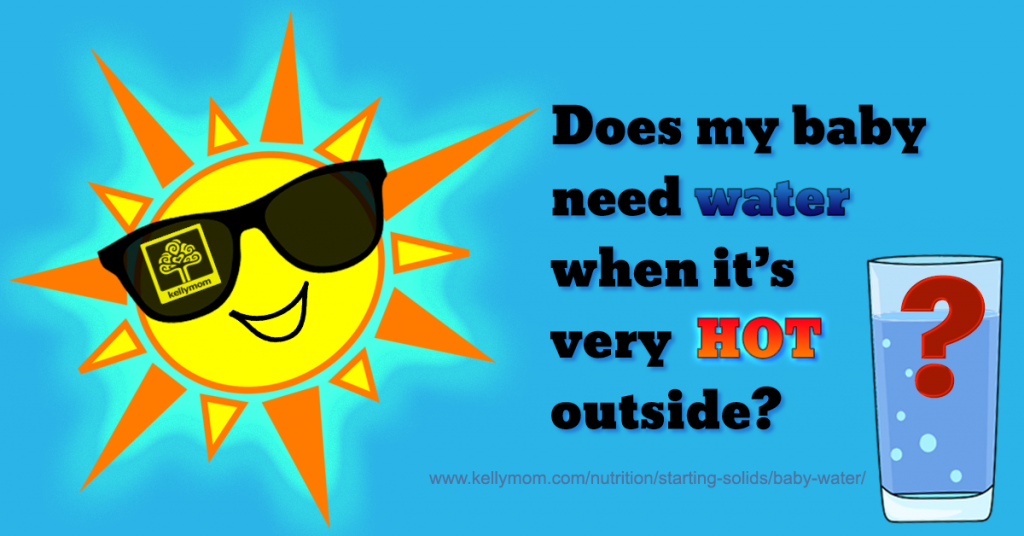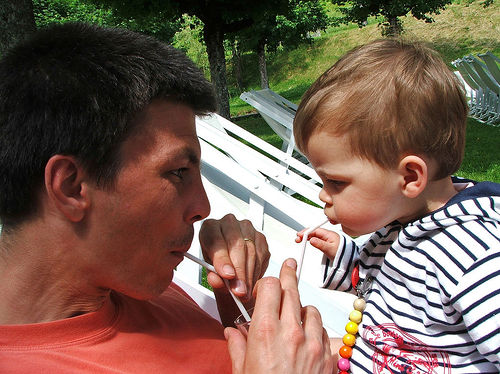Exclusively breastfed babies do not need additional water – breastmilk is 88% water and supplies all the fluids that your baby needs. Even in the first few days after birth, before mom’s milk has “come in”, colostrum is all that is needed to keep baby well hydrated (assuming baby is nursing effectively).
Formula fed babies also do not routinely need extra water. Some sources do suggest offering water to a formula fed baby when it is very hot outside (though baby may prefer to get extra water from more frequent feeding), or when baby is sick with a fever. Consult your baby’s doctor for guidelines.
Now infants can get
all their vitamin D
from their mothers’ milk;
no drops needed with
our sponsor's
TheraNatal Lactation Complete
by THERALOGIX. Use PRC code “KELLY” for a special discount!
Exclusively breastfed babies do not require additional water even when it is very hot outside, as long as baby is allowed to nurse as needed. Even in extremely hot, dry weather your baby can get all the liquids needed via breastmilk. A number of research studies investigating the need for water in exclusively breastfed babies were done in various locations (both humid and dry) at temperatures ranging from 22-41°C (71.6-105.8°F) and 9-96% relative humidity [see references below]; these studies concluded that exclusive breastfeeding provides all the fluids needed.

The Academy of Breastfeeding Medicine advises, “Supplementation in the first few days may interfere with the normal frequency of breastfeeding. Supplementation with water or glucose
water, increases the risk of jaundice, excessive weight loss, and longer hospital stays.” Per the American Academy of Pediatrics, “Supplements (water, glucose water, formula, and other fluids) should not be given to breastfeeding newborn infants unless ordered by a physician when a medical indication exists… During the first 6 months of age, even in hot climates, water and juice are unnecessary for breastfed infants and may introduce contaminants or allergens.”
For newborns (especially under 4-5 weeks), water supplements can be risky
- Babies under two months should not be given supplemental water.
- Water supplements are associated with increased bilirubin levels (jaundice), excess weight loss, and longer hospital stays for newborns.
- Too much water can lead to a serious condition called oral water intoxication.
- Water supplements fill baby up without adding calories, so water supplements can result in weight loss (or insufficient weight gain) for the baby.
- Babies who get water supplements are less interested in nursing. If baby is not nursing as often as he should, it will take longer for mom’s milk to come in and can delay or prevent mom from establishing an optimum milk supply.
For babies past the newborn stage
- Too much water can interfere with breastfeeding because it fills baby up so that he nurses less. Babies need the nutrition and calories in breastmilk to grow – water has none of these.
- Breastmilk has all the water your baby needs, even in very hot weather.
- When your 4-6 month old baby is learning to use a cup, giving him a few sips of water a couple of times a day (no more than 2 ounces per 24 hours) is fine and fun.
- Once baby starts solids, you might want to give him a few sips of expressed milk or water with his solids – some babies need this to prevent constipation.
- For older babies & toddlers, continue to breastfeed and offer water in moderation (4-6 oz per day). Breastmilk supplies plenty of fluids, so many older babies or toddlers who breastfeed without restriction can get the fluids they need through breastfeeding. Others may need a little water with solids to prevent constipation. No need for a bottle – just offer a cup. Most older babies and toddlers particularly like to drink water from a parent’s cup or straw. In our family, we usually offer a cup of water at mealtime, or when someone else is getting a drink, and let the child choose whether or not to drink.
Additional information
Guidelines for offering juice to babies at KellyMom
Do breastfeeding mothers need extra calories or fluids? at KellyMom
Exclusive Breastfeeding: The Only Water Source Young Infants Need FAQ Sheet No. 5 from the Linkages Project
Do Breastfed Babies Need Water? by Anne Smith, IBCLC
Beat the Heat: Summertime Suckling by Teresa Pitman
Babies and Hot Weather–6 Important Things to Know by By Renee Kam IBCLC
Why can’t we give water to a breastfeeding baby before the 6 months, even when it is hot? World Health Organization.
How can I keep my baby safe during hot weather? National Health Service (UK).
Foods and Drinks to Encourage (6-24 months). Centers for Disease Control.
American Academy of Pediatrics Section on Breastfeeding. Breastfeeding and the Use of Human Milk. Pediatrics. 2012 Mar;129(3):e827-841. DOI: 10.1542/peds.2011-3552
Academy of Breastfeeding Medicine Clinical Protocol #3: Supplementary Feedings in the Healthy Term Breastfed Neonate, Revised 2017. Breastfeed Med. 2017;12(3). DOI: 10.1089/bfm.2017.29038.ajk
References
No need for water in hot weather
Almroth S, Bidinger PD. No need for water supplementation for exclusively breast-fed infants under hot and arid conditions. Trans R Soc Trop Med Hyg. 1990;84:602-604. [This study took place in India at temperatures from 35-40°C and relative humidity of 10-35%.]
Almroth SG. Water requirements of breast-fed infants in a hot climate. Am J Clin Nutr. 1978 Jul;31(7):1154-7. [This study took place in Jamaica, at an average outdoor temperature of 27.6°C.]
Armelini PA, Gonzalez CF. Breast feeding and fluid intake in a hot climate. Clin Pediatr. 1979;18:424-425.
Ashraf RN, Jalil F, Aperia A, Lindblad BS. Additional water is not needed for healthy breast-fed babies in a hot climate. Acta Paediatr. 1993 Dec; 82(12): 1007-11. [This study took place in Lahore, Pakistan at temperatures from 27.4-40.7°C and relative humidity of 24-77%.]
Brown KH, Creed de Kanashiro H, del Aguila R, Lopez de Romana G, Black RE. Milk consumption and hydration status of exclusively breastfed infants in a warm climate. J Pediatr. 1986;108:677-680. [This study took place in Peru at temperatures from 26-33°C and relative humidity of 49-96%.]
Cohen RJ, Brown KH, Rivera LL, Dewey KG. Exclusively breastfed, low birthweight term infants do not need supplemental water. Acta Paediatr. 2000 May; 89(5): 550-2. [This study took place in Honduras at temperatures from 22-36°C and relative humidity of 37-86%.]
Goldberg NM, Adams E. Supplementary water for breast-fed babies in a hot and dry climate–not really a necessity. Arch Dis Child. 1983 Jan;58(1):73-4. [This study took place in the Sinai desert, with temperatures between 32 and 37°C]
Sachdev HP, Krishna J, Puri RK. Do exclusively breast fed infants need fluid supplementation? Indian Pediatr. 1992 Apr; 29(4): 535-40.
Sachdev HP, Krishna J, Puri RK, Satyanarayana L, Kumar S. Water supplementation in exclusively breastfed infants during summer in the tropics. Lancet. 1991 Apr 20; 337(8747): 929-33. [This study took place in the tropics at temperatures from 34-41°C and relative humidity of 9-60%.]
Senanayake MP, Weerawarna H, Karunaratne KW, de Silva TU. Do babies need water in Sri Lanka? Ceylon Med J. 1999 Sep; 44(3): 126-9.
Jaundice
de Carvalho M, Klaus MH, Merkatz RB. Frequency of breast-feeding and serum bilirubin concentration. Am J Dis Child 1982 Aug;136(8):737-8.
de Carvalho M, Hall M, Harvey D. Effects of water supplementation on physiological jaundice in breast-fed babies. Arch Dis Child. 1981: 56: 568-569).
Nicoll A, Ginsburg R, Tripp JH. Supplementary feeding and jaundice in newborns. Acta Paediatr Scand 1982 Sep;71(5):759-61.
General
Glover J, Sandilands M. Supplementation of breastfeeding infants and weight loss in hospital. J Hum Lact 1990 Dec;6(4):163-6.
Martin-Calama J, Bunuel J, Valero MT, Labay M, Lasarte JJ, Valle F, de Miguel C. The effect of feeding glucose water to breastfeeding newborns on weight, body temperature, blood glucose, and breastfeeding duration. J Hum Lact 1997 Sep;13(3):209-13.
Scariati PD, Grummer-Strawn LM, Fein SB. Water supplementation of infants in the first month of life. Arch Pediatr Adolesc Med. 1997 Aug;151(8):830-2.
Williams HG. “And not a drop to drink” — why water is harmful to newborns. Breastfeed Rev. 2006 Jul;14(2):5-9

